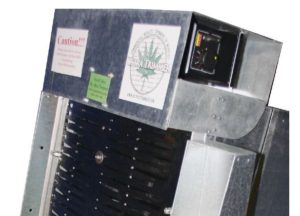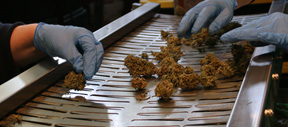The Board affirmed a refusal to register the mark ULTRA TRIMMER for “agricultural machines, namely, a trimming machine for trimming leaves, plants, flowers and buds” on the ground that the goods comprise illegal drug paraphernalia under the federal Controlled Substances Act (CSA). In re Ultra Trimmer, L.L.C., Serial No. 86479070 (November 29, 2016) [not precedential].

The Board has consistently held that use of a mark must be “lawful” to qualify for federal registration. In other words, “any goods … for which the mark is used must not be illegal under federal law.” In re JJ206, LLC, quoting In re Brown.
Although applicant’s identification of goods does not reveal a per se violation of the CSA, extrinsic evidence may be used to show such violation. Examining Attorney Lindsey Ben relied on applicant’s specimen of use (above) and on its website (here) to show that applicant’s machine is illegal drug paraphernalia under Section 863 of the CSA, 21 USC Section 863. Applicant did not dispute that its goods are used to trim marijuana buds.
“Drug paraphernalia,” as defined in the CSA, include equipment for processing or preparing a controlled substance, the possession of which is illegal under that Act. Applicant’s website and promotional materials demonstrate that its machine is intended and design for use in proceeding of marijuana.

Applicant contended that “use in commerce” under Section 1 of the Lanham Act does not require that the use be lawful under federal law. That argument, however, was rejected nearly 50 years ago in In re Stellar Int’l, Inc., wherein the Board ruled that “commerce” under the Lanham Act must necessarily refer to “lawful commerce.” “To hold otherwise would be to place the Patent Office in the anomalous position of accepting as a basis for registration a shipment in commerce which is unlawful under a statute specifically controlling the flow of such goods in commerce.”
Next, applicant maintained that the sale of its machines is exempted from the CSA because such sales are authorized by state law, since 45 states and the District of Columbia permit the sale of marijuana and accessories under various scenarios. Applicant also pointed to the Department of Justice’s “Cole Memo,” which recognizes the lawfulness of these frameworks.
The Board, however, found no evidence that applicant has received a license or other authorization from any local, state, or federal authority allowing it to manufacture, possess, or distribute drug paraphernalia that would otherwise be illegal under the CSA. In short, it has not shown that is exempt from CSA illegality.
The Board addressed the Cole Memo in JJ206, finding that such policy statements lack the force of law. The Cole Memo is only a guide to the exercise of investigative and prosecutorial discretion, and does not provide a defense to violation of federal law.
Finally, applicant argued that the refusal to register constitutes a Constitutional violation because the requirement for establishing lawful use is not evenly applied. It pointed to third-party registrations covering goods that purportedly violated the CSA. However, applicant provided no evidence that the products (pharmaceuticals) violated the CSA when the registrations were issued. Moreover, even if the USPTO allowed a mark similar to applicant’s to be registered, that does not give applicant an equal protection right to a registration. Each application must be examined on its own merits, and decisions regarding other marks do not bind the Board. In sum, there was no showing that the USPTO acted pursuant to some arbitrary or impermissible standard.
And so the Board affirmed the refusal.

